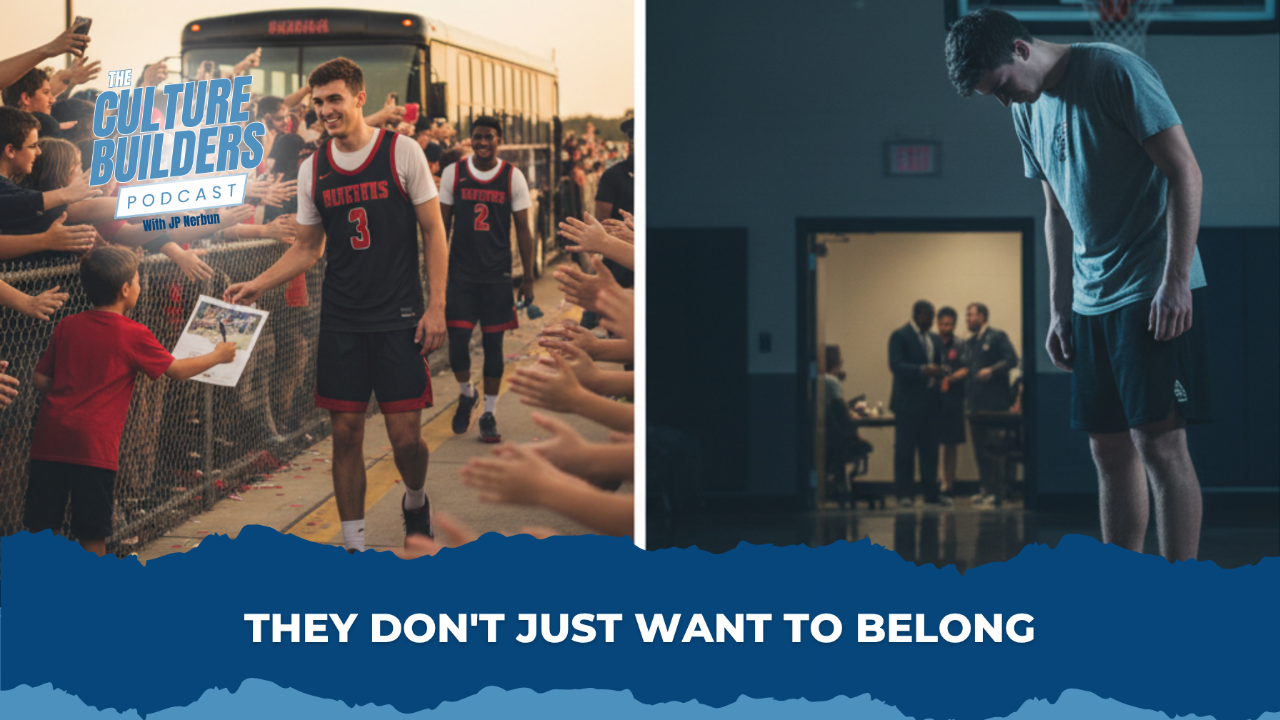They Don't Just Want to Belong

It's March 2006, and I step off the team's private plane in Columbia, SC.
Thousands of fans are gathered along the runway fence, chanting, welcoming us home. We just won the NCAA NIT Championship in Madison Square Garden. Kids and adults press their hands against the chain-link fence, desperate for a high five or an autograph. This is the moment—the one you spend your childhood watching from behind a screen, never thinking you'd be the one walking past it.
I achieved my childhood dream: I walked onto the University of South Carolina basketball team. I got the gear. The private planes. The national TV exposure. The campus fame. But the dream felt empty.
I was a walk-on, a guy who had to beg as hard as I worked just to make the roster. I didn't feel I belonged. For months, "living my dream" had left me the unhappiest I'd ever been. I expected this moment to be like all the others: I’d awkwardly look on, most fans assuming I was the team manager. No requests for my autograph.
But as we walk toward the team bus, a voice shouts my name: “JP! JP! JP! Can we get your autograph?”
They knew my name. What? Was this the result of the two minutes of playing time I got in the semi-final and final?
I smile, moving from fan to fan, signing posters and taking photos. One young boy even tells me I’m his favorite player—he wants to walk on the team someday, just like me. The sense that I belong surges. It has been building all weekend as we traveled and celebrated together. It feels real now; I am not just the unknown man at the end of the bench. For the first time, I can see a future with the team.
A few weeks later, the celebrations are over. The focus shifts to next season. Every player is meeting with a coach one-on-one to discuss off-season workouts and areas for improvement. Every player gets a plan. But nobody ever calls me in. No coach sits down to tell me where I need to improve. Still, I keep showing up.
One day, as I’m leaving the gym after shooting my 1,500th shot, one of the assistants bumps into me. This is the routine moment where a coach checks in with a player—every player but me. Still, I internally hope for a word of encouragement, advice, or feedback. I’ve been putting in the work. They must notice. Instead, the conversation is over before it begins.
“Hey Coach.” “Hey JP.”
That’s it. No "How was your workout?" No "Great work, keep it up." No advice, no questions, no feedback.
I am fed up. Tears well up in my eyes. I think I might be upset with the coaches, BUT in my heart, I know it’s not them.
It’s the sudden, cold realization that I don’t matter.
At that moment, I realized I don’t want the dream anymore—I want out. I could never "quit," not after all I had done to get here, but I knew I could never be happy on this team.
I might have built relationships with my teammates; I may even feel I belong, but I don’t matter to the program. I am never going to contribute in a meaningful way in games or even provide a lot of value in practices.
I thought it was enough to just make the team—to belong. But it turns out I was wrong. I didn't just want to make the team; I wanted to matter to the team.
They Want to Matter
In organizational and team culture, there has been a lot of talk about belonging. Daniel Coyle talked about its importance in The Culture Code. Google’s Project Aristotle highlighted its role in creating psychological safety within a group.
And yet, as my friends at Gaping Void recently pointed out, there is a distinct difference between belonging and mattering: “Belonging just means you fit in culturally. Mattering means you’re essential to the team’s success.”
The more I’ve reflected on this idea, the more it resonates—not just with my own story, but with the countless teams I’ve worked with as a head coach and in my role coaching coaches. Coaches who show deep care for their athletes and work hard to build psychologically safe environments—cultures of belonging—often find it’s still not enough. The player who doesn’t play, doesn’t start, or doesn’t get to be the star grows unhappy. At best, they become disengaged or transfer teams; at worst, they become miserable and spread that misery on the team.
So how do we help people feel they matter, not just belong? HBR’s recent article on The Power of Mattering highlights that people need to be needed, noticed, and affirmed.
Here are six ways to help your people feel they matter:
- High-Quality Connections: Research shows that short 30–60 second moments of fully present connection can be huge for relational impact.
- Scheduled One-on-Ones: Scheduling a dedicated time for a one-on-one conversation shows people they are a non-negotiable priority.
- Open Questions: Showing curiosity in their lives and perspectives is a genuine way of valuing their contribution beyond their output.
- Full Presence: Put away your phone, close out your computer, and give the person your undivided attention.
- Specific Affirmations: Go beyond general praise and affirmations. Instead, notice their feelings and thoughts and validate the effort and struggles, helping them feel truly seen.
- Follow-Up on Commitments: By taking action on things you said you would do to support them, they know you are investing in them outside of your conversations.
One More Thought
In my story of being a walk-on, my personal desire to matter as a player should have led me to a program that better suited my talent and ability. Fortunately for me, only weeks after this quiet moment of realization that I didn’t want to play anymore, one of the assistant coaches called me in for a meeting where they cut me from the team. It hurt, but it was also a massive relief.



